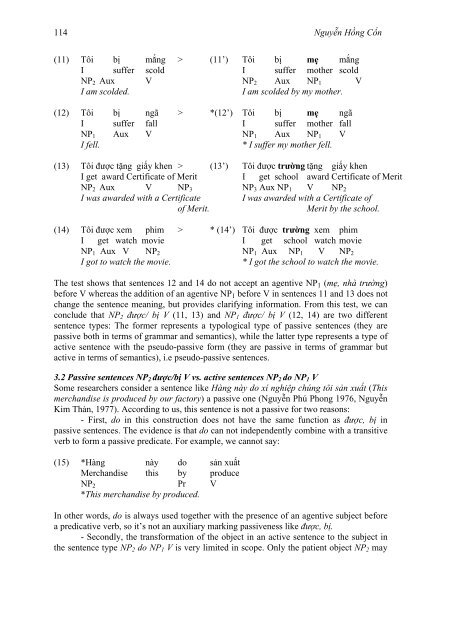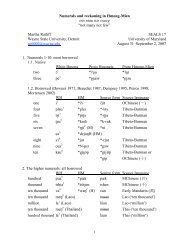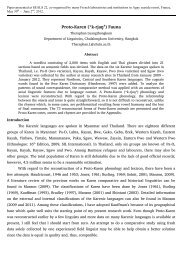proto-southwestern-tai revised: a new reconstruction - seals 22
proto-southwestern-tai revised: a new reconstruction - seals 22
proto-southwestern-tai revised: a new reconstruction - seals 22
You also want an ePaper? Increase the reach of your titles
YUMPU automatically turns print PDFs into web optimized ePapers that Google loves.
114 Nguyễn Hồng Cổn<br />
(11) Tôi bị mắng > (11’) Tôi bị mẹ mắng<br />
I suffer scold I suffer mother scold<br />
NP2 Aux V NP2 Aux NP1 V<br />
I am scolded. I am scolded by my mother.<br />
(12) Tôi bị ngã > *(12’) Tôi bị mẹ ngã<br />
I suffer fall I suffer mother fall<br />
NP1 Aux V NP1 Aux NP1 V<br />
I fell. * I suffer my mother fell.<br />
(13) Tôi được tặng giấy khen > (13’) Tôi được trường tặng giấy khen<br />
I get award Certificate of Merit I get school award Certificate of Merit<br />
NP2 Aux V NP3 NP3 Aux NP1 V NP2<br />
I was awarded with a Certificate I was awarded with a Certificate of<br />
of Merit. Merit by the school.<br />
(14) Tôi được xem phim > * (14’) Tôi được trường xem phim<br />
I get watch movie I get school watch movie<br />
NP1 Aux V NP2 NP1 Aux NP1 V NP2<br />
I got to watch the movie. * I got the school to watch the movie.<br />
The test shows that sentences 12 and 14 do not accept an agentive NP1 (mẹ, nhà trường)<br />
before V whereas the addition of an agentive NP1 before V in sentences 11 and 13 does not<br />
change the sentence meaning, but provides clarifying information. From this test, we can<br />
conclude that NP2 được/ bị V (11, 13) and NP1 được/ bị V (12, 14) are two different<br />
sentence types: The former represents a typological type of passive sentences (they are<br />
passive both in terms of grammar and semantics), while the latter type represents a type of<br />
active sentence with the pseudo-passive form (they are passive in terms of grammar but<br />
active in terms of semantics), i.e pseudo-passive sentences.<br />
3.2 Passive sentences NP2 được/bị V vs. active sentences NP2 do NP1 V<br />
Some researchers consider a sentence like Hàng này do xí nghiệp chúng tôi sản xuất (This<br />
merchandise is produced by our factory) a passive one (Nguyễn Phú Phong 1976, Nguyễn<br />
Kim Thản, 1977). According to us, this sentence is not a passive for two reasons:<br />
- First, do in this construction does not have the same function as được, bị in<br />
passive sentences. The evidence is that do can not independently combine with a transitive<br />
verb to form a passive predicate. For example, we cannot say:<br />
(15) *Hàng này do sản xuất<br />
Merchandise this by produce<br />
NP2 Pr V<br />
*This merchandise by produced.<br />
In other words, do is always used together with the presence of an agentive subject before<br />
a predicative verb, so it’s not an auxiliary marking passiveness like được, bị.<br />
- Secondly, the transformation of the object in an active sentence to the subject in<br />
the sentence type NP2 do NP1 V is very limited in scope. Only the patient object NP2 may





